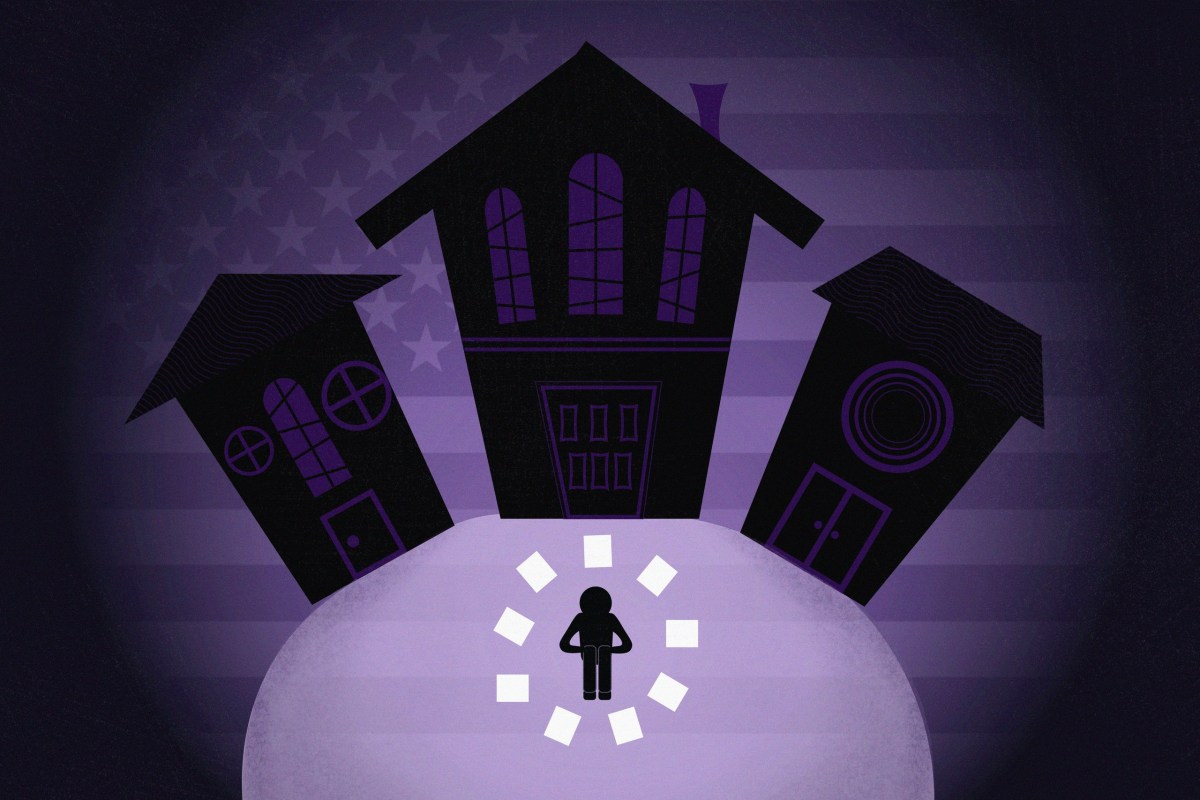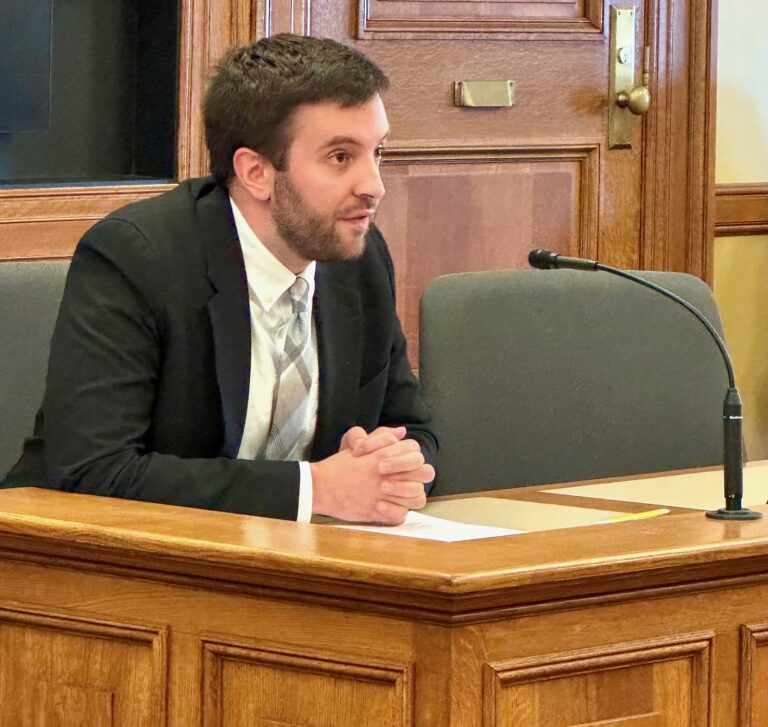This story was produced by Wisconsin Watch, a nonprofit, nonpartisan investigative reporting organization that focuses on government integrity and quality of life issues in Wisconsin.
By Vanessa Swales, Wisconsin Watch

Some regional nonprofits administering Gov. Tony Evers’ $322 million emergency rental assistance program may be unintentionally discouraging non-U.S. citizens from applying — even though immigration status holds no bearing on eligibility for the federally financed program.
At least eight of the 14 organizations administering the Wisconsin Emergency Rental Assistance (WERA) program ask applicants to share their Social Security numbers through pre-screening forms, a Wisconsin Watch review has found. In some cases, applicants are asked to submit the Social Security numbers of every member of their household.
The eight agencies administer aid to 35 of Wisconsin’s 68 WERA-eligible counties.
Meanwhile, only seven of the organizations as of March 24 offered online information in languages other than English in a state where about 260,000 residents primarily speak Spanish and nearly 40,000 speak Hmong.
- Download this story as a Word document
- Download the photos that accompany this story
- View the original story at WisconsinWatch.org
Advocates say Social Security number queries could deter struggling renters who are among Wisconsin’s roughly 75,000 undocumented immigrants — an economically vulnerable group that in 2016 comprised about 24% of the state’s immigrant population and 1.3% of the total population.
Eligible Wisconsin residents can receive up to 12 months of assistance toward their current or overdue rent or utility bills.
The funds flow directly to utility providers or landlords, who could also lose out if tenants are discouraged from applying. A U.S. Centers for Disease Control and Prevention moratorium on evictions restricts landlords from kicking out tenants for nonpayment — if they fill out proper paperwork — through June 30.
Program open to all struggling renters
Evers, a Democrat, tapped the Wisconsin Community Action Program Association (WISCAP) and its member agencies to coordinate the month-old program. Brad Paul, WISCAP’s executive director, told Wisconsin Watch that “there is certainly no effort to discourage people from applying,” and he confirmed that any Wisconsin resident meeting income limits and impacted by the pandemic is eligible to apply.
Paul added: “The most important thing to know is that individuals are best served by contacting their local community action agency. Among other things, these agencies are often doing outreach through bilingual staff.”
Application instructions vary between agencies administering WERA, but only one of their websites as of March 24 specified that applicants without Social Security numbers may still qualify.
The head of one Wisconsin immigrant advocacy group said that non-citizen renters who fear scrutiny of their legal status might hesitate to approach agencies asking for such information.
“We know that the Social Security number is a red flag for a lot of individuals,” said Darryl Morin, president and CEO of Forward Latino, based in Franklin, Wisconsin.
Morin said he frequently chats about immigrant affairs with Evers and Department of Administration Secretary Joel Brennan, whose agency oversees the rental assistance program. But Morin added that was unaware of the Social Security number issue for rental assistance.
“I will definitely now, with you bringing that up, investigate it and be sure to communicate directly with (Evers’) office on the need to take corrective action,” he told Wisconsin Watch.
Mariel Block, a staff attorney with the National Housing Law Project, a legal and advocacy organization, called the Social Security number query “a gigantic problem” that could deter some applications.
“That is still off-putting for a lot of people who are non-citizens, who have gone through — especially over the last few years — absolute terror,” Block said. “Even being asked that and not knowing where your information is going and not knowing that there’s going to be immigration consequences is very, very scary.”
Evers administration officials say they have no intention of discouraging any applicants.
Molly Dillman Vidal, a Department of Administration spokesperson, said her department is working with WISCAP agencies to “ensure a uniform message is provided to applicants regarding the fact that undocumented persons are not required to provide (Social Security numbers) to apply for WERA.”
Paul told Wisconsin Watch that the state is contracting United Migrant Opportunity Services (UMOS), a WISCAP member that provides a variety of services to Wisconsin’s migrant and seasonal workers and other diverse populations, to provide outreach around rental assistance.
But with April rent bills looming, UMOS had not received a contract as of March 23, according to an UMOS spokesperson who described the group’s outreach plans.
“We are aware that the state’s existing forms are used for multiple purposes and asks for Social Security information,” the spokesperson said in an email. “UMOS staff will share with families that they do not need a Social Security number to apply.”
Immigration status not factor
In approving its second round of pandemic stimulus in December, Congress earmarked $25 billion for state and local rent aid — a lifeline for renters and landlords as COVID-19 worsened housing hardships.
In Wisconsin alone, renters last year faced an estimated rent shortfall of $139 million to $260 million, and up to 260,000 households are at risk of eviction, according to an analysis of census data by Stout Risius Ross LLC, an international consulting and investment banking firm.
Immigrants without Social Security numbers are particularly vulnerable during the pandemic, because they qualify for so few benefits programs. In Wisconsin and other states, they can’t access health care through Medicaid, nor can they draw state food or unemployment assistance. Federal pandemic stimulus checks, too, only go to those with Social Security numbers.
But Congress in December left rental relief open to non-citizens, and neither states nor local governments may impose their own immigration restrictions in lieu of the federal government, according to a National Housing Law Project fact sheet published in February. In December, a federal judge ruled that the city of Phoenix could not exclude “unqualified aliens” from its federally funded emergency rent, mortgage and utility program.
‘Critically important’ program
Congress sent nearly $387 million in rental aid to Wisconsin. Evers has funneled most of the funds into WERA, which he announced on Feb. 25.
“While we continue working to get vaccines distributed and shots in arms as soon as we have supply, these funds will be critically important providing families the stability and support they need to get through this pandemic,” he said at the time.
Applicants must demonstrate a risk of experiencing housing instability, have lost income due to the COVID-19 pandemic and earn a household income no higher than 80% of their county’s median income.
A previous initiative — the far smaller Wisconsin Rental Assistance Program — distributed about $28 million in federal aid from June to November 2020 through WISCAP organizations. That program barred unauthorized immigrants or others without Social Security numbers. Some agencies last year struggled to meet high demands for rental help, particularly Milwaukee’s Social Development Commission, which saw application backlogs in the thousands.
WERA does not cover some larger communities, which run their own federally funded programs. Those include Brown, Dane, Milwaukee and Waukesha counties and the cities of Madison and Milwaukee.
The program has distributed more than $7 million in aid as of March 19, according to Paul. Community Action Inc., which services Rock and Walworth counties, has delivered the most assistance — more than $1 million.
Social Security question lingers
Agencies across Wisconsin as of March 24 continued to ask for Social Security numbers at some point in the application process — even though they are not required for rental assistance.
Newcap, which serves nine counties in northern Wisconsin, initially required a Social Security number on its intake form, but a recent update allows applicants to skip that field.
“NO Social Security Number is required to apply for or receive assistance,” its website now says.
Wisconsin Watch found discrepancies between Lakeshore CAP’s English and Spanish-language intake questions. The Spanish version of the form asked renters questions about income and their rental agreement that did not appear in the English-language equivalent. That agency serves Door, Kewaunee, Manitowoc and Sheboygan counties.
Colleen Homb, the group’s executive director, said the forms would be updated to match.
Most of the agencies pre-screen WERA applicants by asking them to first fill out an application for state energy and weatherization assistance, which is also used to determine eligibility for other services. The Wisconsin Home Energy Assistance Program (WHEAP) form asks applicants to share photo identification and the Social Security numbers of every household member.
“I understand I am responsible for reporting the names of all persons living at my address and the Social Security number and income of all persons in my household,” that application says. “Collection of Social Security number is not prohibited by federal law and is a required data element for tracking applicant benefits granted by this program.”
Nearly 116,000 Wisconsinites lived with at least one undocumented family member between 2010 and 2014, according to an analysis from the Center for American Progress, a liberal-leaning think tank in Washington, D.C. That tally included nearly 56,000 U.S. citizens.
Wendy Schneider, of Central Wisconsin Community Action Council, said that applicants without Social Security numbers must first apply and be denied for energy assistance before receiving rental help.
Paul said that rental aid applicants who do not qualify for energy assistance — if they lack a Social Security number, for instance — should specify on the form that they seek only rental aid.
He said a state hotline also offers help: 1-833-900-9372, the number for Energy Services, Inc.
When a reporter called on March 5, a hotline operator lacked advice for non-citizen applicants.
“I don’t know exactly how they do,” the operator said. “I’m here to take people’s information to make sure they have energy assistance.”
Energy Services, Inc. did not respond to additional calls and emails for comment.
Dillman Vidal, of the Department of Administration, said WISCAP agencies can choose whether to use the state energy assistance form to collect rental applicants’ information, but using it boosts efficiency.
Emails between Department of Administration officials and a group of translators show that WERA administrators contemplated adding a question to Spanish and Hmong-language FAQs that translates to: “Are the following immigrant families eligible?: Legal residents, but non-citizens, or undocumented families?”
The draft answer specified that eligible renters must be Wisconsin residents, but it did not answer the question of U.S. citizenship.
A Hmong version of an FAQ with that language appears on Community Action, Inc’s website. Wisconsin Watch could not find it on other websites.
‘A lot of confusion and disorganization’
Outside of WERA, Community Advocates, which delivers federal rental assistance to Milwaukee and Waukesha counties, collects applicant information on a form it uses to process applications for a host of benefits programs it administers — including other programs with more stringent requirements. That form includes a space for filling in Social Security numbers, but it can be skipped.
“Because we understand there might still be hesitation or mistrust, as a best practice, we have built relationships with organizations who serve immigrants and refugees to facilitate the rent assistance application process in partnership with us,” said Deb Heffner, the group’s housing strategy director.
Block, of the National Housing Law Project, said state and local governments nationwide face “an absolutely enormous administrative challenge” in distributing so much housing aid.
And while states such as Washington make clear in their materials that undocumented residents can qualify for rental assistance, Block said, several states do not.
“They’re understandably on a very fast timeline,” Block said. “There’s a lot of confusion and disorganization involved in this.”
Wisconsin Watch (wisconsinwatch.org) collaborates with WPR, PBS Wisconsin, other news media and the University of Wisconsin-Madison School of Journalism and Mass Communication. All works created, published, posted or disseminated by Wisconsin Watch do not necessarily reflect the views or opinions of UW-Madison or any of its affiliates.



